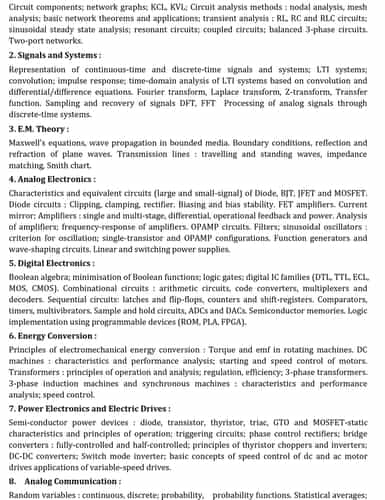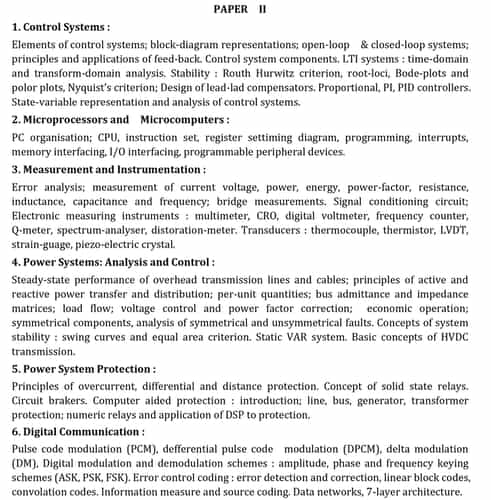UPSC Electrical Engineering Syllabus: Download Latest Syllabus PDF
By BYJU'S Exam Prep
Updated on: November 14th, 2023
UPSC Electrical Engineering Syllabus includes topics related to Analog and Digital Electronics, Microprocessors, Power Systems, etc. Electrical engineering is a technical subject, and apart from this UPSC offers two other technical subjects namely Civil Engineering and Mechanical Engineering.
The UPSC Electrical Engineering Syllabus requires a strong strategy from the candidates to be covered. Candidates who have an interest and background in this subject should take it as it would be difficult for other candidates to cover this vast UPSC electrical engineering optional syllabus.
Table of content
-
1.
UPSC Electrical Engineering Syllabus Overview
-
2.
UPSC Electrical Engineering Syllabus PDF
-
3.
UPSC Electrical Engineering Optional Paper 1
-
4.
UPSC Electrical Engineering Optional Paper 2
-
5.
UPSC Electrical Engineering Syllabus- Preparation Strategy
-
6.
UPSC Electrical Engineering Optional Syllabus- Books
UPSC Electrical Engineering Syllabus Overview
As the table mentions, each paper of the UPSC electrical engineering syllabus carries 250 marks and a total of 500 marks. Candidates should try to score as much as possible as it will highly impact the overall score of the UPSC Exam. Understanding the UPSC electrical engineering syllabus would be the first step towards acing this subject.
The UPSC electrical engineering optional syllabus may feel relevant to the candidates who have studied electronics, or electrical engineering in their graduation, or master’s degree. There will be two papers in the UPSC electrical engineering syllabus, Paper 1 and Paper 2.
| UPSC Electrical Engineering Syllabus | Marks |
| UPSC Electrical Engineering Optional Syllabus Paper 1 | 250 |
| UPSC Electrical Engineering Optional Syllabus Paper 2 | 250 |
UPSC Electrical Engineering Syllabus PDF
Candidates can download the UPSC electrical engineering optional syllabus directly from the link given below.
- UPSC Electrical Engineering Syllabus PDF
- UPSC Electrical Engineering Optional Syllabus in Hindi
UPSC Electrical Engineering Optional Paper 1
Paper 1 of the UPSC electrical engineering syllabus includes topics like Circuit Theory, E.M Theory, Digital Electronics, Analog Electronics, and others. Let’s take a look at the complete syllabus below.



UPSC Electrical Engineering Optional Paper 2
The UPSC electrical engineering syllabus paper 2 is divided into 6 topics, and these topics are further divided into sub-topics.

UPSC Electrical Engineering Syllabus- Preparation Strategy
- Take a printout of the syllabus– The UPSC electrical engineering optional syllabus is vast in nature, and that is why candidates should take a photocopy of it. In this way, they won’t miss any crucial topics or invest their time and energy in unrelated topics.
- Solve problems– it is essential for the candidates to focus on numerical problems along with the theory paper. Maintaining a balance between the both would be beneficial for them.
- Glace through previous year’s questions– the candidates should check out the previous year’s UPSC question papers. It will help them to understand which topics from the UPSC electrical engineering syllabus are crucial.
- Note-Making- Making small notes is a must because the UPSC electrical engineering optional syllabus is vast. Short notes can be used for a quick revision, and provide that finishing touch just before the exam.
UPSC Electrical Engineering Optional Syllabus- Books
Here is a list of the best books to cover the UPSC electrical engineering syllabus efficiently.
- Electromagnetic Fields & Waves- Kd Prasad
- Digital Logic and Computer Design-M. Morris Mano
- Principles of Electronics – V .K. Mehta
- Radio Engineering – G.K. Mithal
- Circuit Analysis – Gupta Electrical Technology – Thareja
- Automatic Control System – Benjamin C. Kuo
- Energy Conversion: Ashfaq Hussain
- Circuit Theory: Analysis and Synthesis- A. Chakrabarti
- Signals and Systems-Alan V. Oppenheim, Alan V. Willsky, S. Hamid Nawab
- Physics of Semiconductor Devices – Simon Sze
- Elements of Engineering Electromagnetics – Nannapaneni Rao
- Electromagnetic Waves and Field – R.N. Singh
- Control Systems Engineering – Nagrath Gopal
- Semiconductor – Nag Choudhary
- Integrated Circuits – D. Roy Choudhary
- Analog Electronics: J.B. Gupta
- Network Analysis – Valkenburg
- Basic Current Analysis – Murthy
- Electromagnetic Waves and Radiating System – Jordan & Balmain
- Modern Central Engineering – Katsuhiko Ogata
- Microprocessors and Microcomputers- R. S Gaonkar
- Topics in Communication Theory – David Middleton
